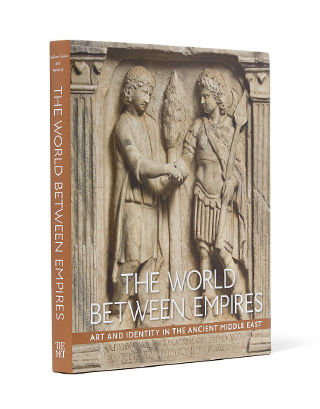
Featuring 190 objects of exceptional importance, this essential volume takes readers on a fascinating journey across two millennia.
Buy NowFor over three centuries, the territories and trading networks of the Middle East were contested between the Roman and Parthian Empires (ca. 100 B.C.–A.D. 250), yet across the region life was not defined by these two superpowers alone. Local cultural and religious traditions flourished, and sculptures, wall paintings, jewelry, and other objects reveal how ancient identities were expressed through art. Featuring 190 works from museums in the Middle East, Europe, and the United States, this exhibition follows a journey along the great incense and silk routes that connected cities in southwestern Arabia, Nabataea, Judaea, Syria, and Mesopotamia, making the region a center of global trade. Several of the archaeological sites featured, including Palmyra, Dura-Europos, and Hatra, have been damaged in recent years by deliberate destruction and looting, and the exhibition also examines these events and responses to them.
Accompanied by a catalogue and an audio guide.
"Packed with surprises" —The New York Times
"Nothing short of spectacular" —The Wall Street Journal
"An outstanding array of images of the divine" —The New York Review of Books
"Dismantl[es] fundamental, reflexive ideas about the Roman world. . . . a refusal of familiar categories" —The Washington Post
"An unrivaled assembly of objects" —The New York Review of Books
The exhibition is made possible by Dorothy and Lewis B. Cullman.
Additional support is provided by the Gail and Parker Gilbert Fund and the Ruddock Foundation for the Arts.
The catalogue is made possible by The Andrew W. Mellon Foundation.
Browse all videos about The World between Empires, including curator talks and a two-day symposium about the exhibition.
How is identity expressed through art? In this Audio Guide with Met experts, gain insight into the stories behind these ancient objects and discover what they reveal about the period's political superpowers and local artistic, religious, and cultural traditions.

A Now at The Met blog post reveals new findings about one of the most superbly crafted objects in the exhibition.
Statuette of a goddess (detail), 1st century B.C.–1st century A.D. Babylon. Alabaster, stucco, gold, and rubies, H. 10 1/4 in., W. 2 in., D. 2 in. (26 x 5 x 5 cm). Musée du Louvre, Paris (AO 20127) © RMN-Grand Palais / Art Resource, NY